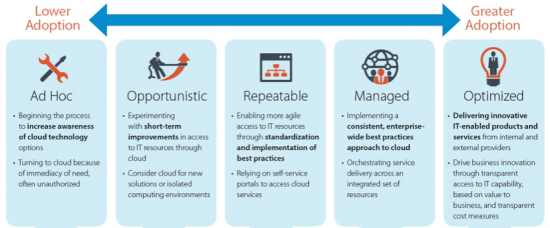































Disrupt or be disrupted. That's the mantra of IT organizations and boardrooms across the globe. At least in the ones that will still be around. A recent report projects that digital disruption will displace approximately 40 percent of incumbent companies in each of the 12 industries studied within the next five years. The winners will be those companies that can innovate faster than their competitors. And they're relying on the cloud (private, public, or hybrid) to get it done.
According to a new Cisco-sponsored IDC report ("Don't Get Left Behind: The Business Benefits of Achieving Greater Cloud Adoption"), around four in 10 organizations have already adopted public or private cloud services. Up until now the primary goal of cloud adoption has been that of increasing efficiency and lowering costs. But a "second wave" of cloud adoption is emerging. Businesses are now adopting cloud to achieve transformative and measurable business value:
These second-wave adopters expect cloud to make them faster, more innovative, and more disruptive. But as the Cisco-sponsored study also shows, the outcomes businesses realize from cloud are closely tied to the maturity of their cloud strategies.
IDC and Cisco view cloud adoption along a spectrum. Businesses range from "Ad Hoc"- the experimental stage where lines of business use cloud to fulfill an immediate need, often unauthorized by IT-all the way to those with repeatable, centrally managed cloud platforms that connect stakeholders with innovative IT products and services from both internal and external providers. Businesses with the most mature, or "Optimized," cloud strategies are the ones seeing the most significant business benefits.
The Cisco-sponsored research shows that the key performance indicators (KPIs) businesses care about most-increased top-line revenues, strategic IT budget allocation, greater flexibility to reuse IT assets and staff-all increase as you move up the adoption curve. According to the survey, companies taking the final step to an Optimized cloud strategy realize, on average:
But just 1 percent of the companies surveyed currently have Optimized cloud strategies. Most organizations are still at the low end of the maturity curve. Which means, they're not fully capitalizing on the cloud.

It's time to take the next step. That means answering key questions: How do you know which workloads to place on which resources? How will moving a particular workload to the cloud affect your costs, scalability, security, and data governance? When should you use public cloud versus dedicated or private resources?
The answers are different for every business, and you should be thinking about them now. Cisco can help. We've worked closely with IDC to harness this data and apply it your specific environment based on where you are in your journey to the cloud. We can show you how to get started, what to work on first, how your cloud strategy compares to peers in your industry sector, and what the top- and bottom-line impact could be for you.
We all know that cloud is a significant disruption to the classic IT model. But when CIOs embrace a diversified IT services provisioning model that includes cloud, they reinforce the central role of IT as an engine to fuel new revenues, market disruption, and innovation for the business. The business becomes the disruptor, not the disrupted.
How does your cloud adoption stack up against your industry peers, and what steps should you take next? Explore the possibilities by taking the Cisco Business Cloud Advisor Adoption Survey. You'll receive a free personalized summary for your organization.
[1] Source: IDC InfoBrief, sponsored by Cisco, Don't Get Left Behind: The Business Benefits of Achieving Greater Cloud Adoption, Aug 2015.
 Tags quentes :
Tags quentes :